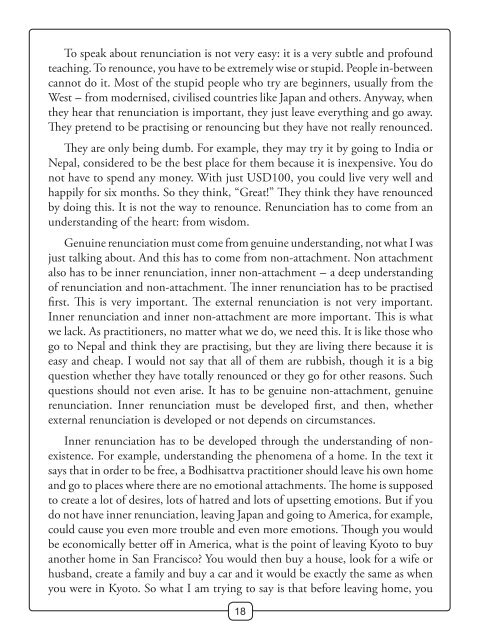Gyalsey_Laglen_v2_24092014_e-book
Gyalsey_Laglen_v2_24092014_e-book
Gyalsey_Laglen_v2_24092014_e-book
Create successful ePaper yourself
Turn your PDF publications into a flip-book with our unique Google optimized e-Paper software.
To speak about renunciation is not very easy: it is a very subtle and profound<br />
teaching. To renounce, you have to be extremely wise or stupid. People in-between<br />
cannot do it. Most of the stupid people who try are beginners, usually from the<br />
West - from modernised, civilised countries like Japan and others. Anyway, when<br />
they hear that renunciation is important, they just leave everything and go away.<br />
They pretend to be practising or renouncing but they have not really renounced.<br />
They are only being dumb. For example, they may try it by going to India or<br />
Nepal, considered to be the best place for them because it is inexpensive. You do<br />
not have to spend any money. With just USD100, you could live very well and<br />
happily for six months. So they think, “Great!” They think they have renounced<br />
by doing this. It is not the way to renounce. Renunciation has to come from an<br />
understanding of the heart: from wisdom.<br />
Genuine renunciation must come from genuine understanding, not what I was<br />
just talking about. And this has to come from non-attachment. Non attachment<br />
also has to be inner renunciation, inner non-attachment - a deep understanding<br />
of renunciation and non-attachment. The inner renunciation has to be practised<br />
first. This is very important. The external renunciation is not very important.<br />
Inner renunciation and inner non-attachment are more important. This is what<br />
we lack. As practitioners, no matter what we do, we need this. It is like those who<br />
go to Nepal and think they are practising, but they are living there because it is<br />
easy and cheap. I would not say that all of them are rubbish, though it is a big<br />
question whether they have totally renounced or they go for other reasons. Such<br />
questions should not even arise. It has to be genuine non-attachment, genuine<br />
renunciation. Inner renunciation must be developed first, and then, whether<br />
external renunciation is developed or not depends on circumstances.<br />
Inner renunciation has to be developed through the understanding of nonexistence.<br />
For example, understanding the phenomena of a home. In the text it<br />
says that in order to be free, a Bodhisattva practitioner should leave his own home<br />
and go to places where there are no emotional attachments. The home is supposed<br />
to create a lot of desires, lots of hatred and lots of upsetting emotions. But if you<br />
do not have inner renunciation, leaving Japan and going to America, for example,<br />
could cause you even more trouble and even more emotions. Though you would<br />
be economically better off in America, what is the point of leaving Kyoto to buy<br />
another home in San Francisco You would then buy a house, look for a wife or<br />
husband, create a family and buy a car and it would be exactly the same as when<br />
you were in Kyoto. So what I am trying to say is that before leaving home, you<br />
18


